|
|
|
Sort Order |
|
|
|
Items / Page
|
|
|
|
|
|
|
| Srl | Item |
| 1 |
ID:
123353
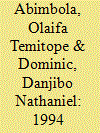

|
|
|
| 2 |
ID:
140763
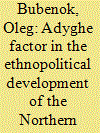

|
|
|
|
|
| Summary/Abstract |
The 150th anniversary of the end of the Caucasian War, which caused havoc in the lives of the Circassians, coincided with the 2014 Winter Olympics in Sochi organized on the land where Circassians (Adyghes) had long lived. These two events revived an interest in the Circassian question and showed that the lacunae in the history of the Adyghes, making an unbiased approach to the issue, impossible should be filled with facts. Repatriation of the Circassians to the Caucasus and a unified Adyghe republic are impossible in Russia’s political reality.
|
|
|
|
|
|
|
|
|
|
|
|
|
|
|
|
| 3 |
ID:
183670
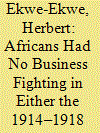

|
|
|
|
|
| Summary/Abstract |
The wars of 1914–1918 and 1939–1945 are without parallel in the expansive stretch of decades of the pan-European conquest and occupation of Africa in creating such profound opportunity to study the very entrenched desire by the European conqueror-states in Africa to perpetuate their control on the continent and its peoples indefinitely. The two principal protagonists in each conflict, Britain and Germany, were the lead powers of these conqueror-states that had formally occupied Africa since 1885. Against this cataclysmic background of history, Africans found themselves conscripted by both sides of the confrontation line in 1914–1918 to at once fight wars for and against their aggressors during which 1 million Africans were killed. Clearly, this was a case of double-jeopardy of conquered and occupied peoples fighting for their enemy-occupiers. In the follow-up 1939–1945 war, when Germany indeed no longer occupied any African land (having been defeated in the 1914–1918 encounter), Britain and allies France and Belgium (all continuing occupying powers in Africa) conscripted Africans, yet again, to fight for these powers in their new confrontation against Germany, and Japan, a country that was in no way an aggressor force in Africa. Hundreds of thousands of Africans were killed in this second war. In neither of these conflicts, as this study demonstrates, do the leaders of these warring countries who occupied (or hitherto occupied) Africa ever view their enforced presence in Africa as precisely the scenario or outcome they wished their own homeland was not subjected to by their enemies. On the contrary, just as it was their position in the aftermath of the 1914–1918 war, Britain, France, Belgium, Spain and Portugal in 1945 each envisaged the continuing occupation of the states and peoples of Africa they had seized by force prior to these conflicts. Winston Churchill, the British prime minster at the time, was adamant: ‘I had not become the king’s first minister in order to preside over the liquidation of the British Empire’. Charles de Gaulle, leader of the anti-German ‘free French forces’, was no less categorical on this score: ‘Self-government [in French-occupied Africa, Asia, the Caribbean, South America, the Pacific and elsewhere in the world] must be rejected – even in the more distant future’.
|
|
|
|
|
|
|
|
|
|
|
|
|
|
|
|
| 4 |
ID:
171095


|
|
|
|
|
| Summary/Abstract |
[T]he historical record remains bitterly contested in the former Yugoslav lands, and none of the tribunal's findings has promoted reconciliation.
|
|
|
|
|
|
|
|
|
|
|
|
|
|
|
|
| 5 |
ID:
190841
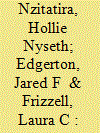

|
|
|
|
|
| Summary/Abstract |
Recent studies of genocide have yielded varying estimates of the number and characteristics of people who engaged in violence. We address these disparities in estimates for one well-studied case: the 1994 genocide in Rwanda. Using novel data from Rwanda’s post-genocide gacaca courts, we provide updated estimates regarding participants. Specifically, we find that between 847,233 and 888,307 people participated in the genocide, with 181,280 to 190,113 people found guilty of only violent offenses, 618,164 to 654,152 individuals found guilty of only property crimes, and 44,042 to 47,789 individuals found guilty of both property and violent crimes. In total, we estimate that between 229,069 and 234,155 individuals were found guilty of a violent offense, including those who committed violent offenses as well as both violent and property offenses. These results align with past research, representing an important convergence of evidence regarding participation in this genocide. We also calculate specific characteristics of participants, finding that nearly 90% of all participants were men and that the median age for all participants was 34. Although most participants committed a single crime, between 215,124 and 222,522 people were found guilty of multiple crimes. Approximately 6% of people accounted for 25% of the property crimes, while 11% of people accounted for 25% of the violent crimes. These findings provide foundational information about one of the deadliest episodes of mass violence in the 20th century.
|
|
|
|
|
|
|
|
|
|
|
|
|
|
|
|
| 6 |
ID:
133716
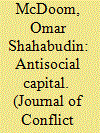

|
|
|
|
|
| Publication |
2014.
|
| Summary/Abstract |
Although popularly perceived as a positive force important for objectives such as economic development and democracy, social capital may also be linked to less desirable outcomes. This article highlights a dark side to social capital by pointing to its role in a particularly pernicious phenomenon: genocidal violence. Drawing on a survey of residents from one community that experienced violence during Rwanda's 1994 genocide, I show that individual participation in the violence was partly determined by the features of residents' social networks. Perpetrators possessed larger networks in general and more connections to other perpetrators in particular. The quality as well as quantity of connections also mattered. Strong ties generally, and kinship and neighborly ties specifically, were strong predictors of participation. In contrast, possession of countervailing ties to nonparticipants did not reduce a resident's likelihood of participation. Drawing on in-depth interviews to explore the possible mechanisms behind these findings, I suggest participants' networks fulfilled functions of information diffusion, social influence, and behavioral regulation. More broadly, the findings suggest the importance of social structure and social interaction for participation in collective violence. Relational data should complement individual attribute data in predicting participation. The findings also suggest, contrary to the neo-Malthusian interpretation, that the role played by Rwanda's extraordinarily high population density in the violence may have been more sociological than ecological in origin. The diffusion, influence, and regulatory effects of social connections are likely to be amplified in communities where individuals live in close spatial proximity to each other.
|
|
|
|
|
|
|
|
|
|
|
|
|
|
|
|
| 7 |
ID:
176210
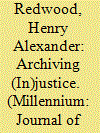

|
|
|
|
|
| Summary/Abstract |
This article explores the role that archives play in the constitution and governance of the international community. First, drawing on post-colonial scholarship, it develops a framework to explicate the link between archive and community, centring on questions of voice, identity and responsibility. It then examines how the archive can be analysed, pointing additionally to the importance of the archive’s materiality. Second, these ideas are explored through a reading of the International Criminal Tribunal for Rwanda’s (ICTR) archive, which helped rebuild the international community in the wake of its failure to prevent the Rwandan genocide. By providing a detailed reading of the ICTR’s records, and drawing on the framework established in the first section, the article shows that the archive constructed a liberal, patriarchal and colonial understanding of the international community.
|
|
|
|
|
|
|
|
|
|
|
|
|
|
|
|
| 8 |
ID:
190698
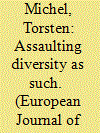

|
|
|
|
|
| Summary/Abstract |
Dehumanisation is one of the most invoked factors in analyses of mass atrocities with many scholars focusing on its crucial role in enabling perpetrators to inflict violence on their victims. However, while its application is widespread, its relevance is often assumed a priori, with claims regarding its empirical relevance often asserted rather than argued for. Not only does its meaning, nature, and function remain amorphous, current scholarship also lacks a general conceptualisation of the basic features that bind the manifold appearances of dehumanisation together. It is this paucity of sustained reflection and particularly the lack of conceptual clarity that the present article seeks to address. Drawing on the work of Hannah Arendt, it aims to deliver a more thoroughgoing appraisal of the nature of dehumanisation as a fundamental violation of plurality to conceptually consolidate and ground its meaning and bind together its diverse manifestations across cases of mass violence.
|
|
|
|
|
|
|
|
|
|
|
|
|
|
|
|
| 9 |
ID:
169231
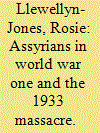

|
|
|
|
|
| Summary/Abstract |
The recent discovery of a bundle of documents in the archives of the Royal Society for Asian Affairs has shed more light on the history of the Assyrian Christians of Iraq from the time of the First World War up to the Simele massacre in 1933. The documents are accounts and correspondence written primarily by a number of leading British players including Major-General Dunsterville, Sir Henry Dobbs, Colonel J.J. McCarthy, and also the Assyrian Patriarch Mar Shimun. They also shed further light on the role played by Leo Amery, Secretary of State for the Colonies. The documents appear to have been compiled by Sir Percy Sykes, the then Secretary of the Royal Central Asian Society (as the Royal Society for Asian Affairs then was) as part of an investigation into the situation of the Assyrians. This article introduces the newly-discovered collection of documents and discusses how they advance our understanding of this period.
|
|
|
|
|
|
|
|
|
|
|
|
|
|
|
|
| 10 |
ID:
132077
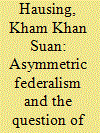

|
|
|
|
|
| Publication |
2014.
|
| Summary/Abstract |
This article intends to fill a glaring void in the existing academic literature on the issues and challenges which stem not only from crafting, but also making asymmetric federalism work in northeast India. It examines the extent and limits to which asymmetric federalism-specifically under Article 371A of India's Constitution-not only negotiates Nagas' sovereignty claims over their land and resources and caters to the demands of democratic justice, but also the extent to which it consolidates India's state-nation and democracy building in its northeastern periphery. Contending that the extant asymmetric federal arrangement in India's polity stems from a centralist federal framework, the article makes a case for a more robust asymmetric federalism, which goes beyond this framework.
|
|
|
|
|
|
|
|
|
|
|
|
|
|
|
|
| 11 |
ID:
113988


|
|
|
|
|
| Publication |
2012.
|
| Summary/Abstract |
De-legitimization of the State of Israel is the current episode in a persistent genocidal project aimed at the Jews and, more profoundly, at the values inherent in Judaism and shared by civilized societies. Skirting the shame attached to anti-Semitism after the horrors of the Holocaust, contemporary advocates of the genocidal plot are given free rein to attack Jews by a combination of severe criticism of the State of Israel and well-meaning plans for its geopolitical future, i.e. the peace process. Ugly lies - the Jews stole the land from the Palestinians, Israel is an apartheid state - function like the age-old charges that justified persecution of the Jews as Christ killers. Beautiful lies - the two state solution that everyone knows - echo the proto-legalistic measures that gradually deprived European Jews of their rights, their strength, their resources and capacity to resist deportation and extermination. Americans, misinterpreting as a repetition of the 1930s the rise of violent anti-Semitism in Europe at the dawn of the twenty-first century, are unprepared to deal with a parallel rise in Muslim Brotherhood forces within the US. As brutal Islamic Jew hatred boils in an Arab-Muslim world revolting, reforming, and submitting to sharia law, the Obama administration conducts a policy of the outstretched hand and blindfolded eyes that leaves Iran free to develop the ultimate genocidal weapon. Israel is the bulwark, not only for Jews but for the free world. Clear thinking, uncompromising discourse, and resolute action - at the risk of being labelled extremist - can stop the genocidal project and, working backward, disarm the lies.
|
|
|
|
|
|
|
|
|
|
|
|
|
|
|
|
| 12 |
ID:
172845
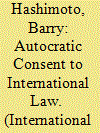

|
|
|
|
|
| Summary/Abstract |
This article contributes to an understanding of why autocrats have accepted the jurisdiction of the International Criminal Court. Leveraging their ability to obstruct their own prosecution, autocrats have traded off the risk of unwanted prosecutions against the deterrent threat that prosecutions pose to political rivals and patrons of their enemies conspiring to oust them. The risk of unwanted prosecutions and the court's deterrent threat both arise because ICC prosecutions credibly communicate guilt for international crimes to capital-disbursing democracies, which may, insofar as possible, use leader-specific economic statecraft to prevent the administration of foreign states by those whom the court signals are guilty of international crimes. Analysis using fixed effects and matching shows that a greater reliance on capital publicly financed by democracies increased the probability that a state accepted the court's jurisdiction only when it was an autocracy (1998–2017). ICC jurisdiction also lengthened the tenure of autocrats and reduced the severity of civil conflict in autocracies.
|
|
|
|
|
|
|
|
|
|
|
|
|
|
|
|
| 13 |
ID:
041324


|
|
|
|
|
| Edition |
rev. 2nd ed.
|
| Publication |
Dacca, Begum Dilafroz Quaderi, 1972.
|
| Description |
xv, 455p.hbk
|
|
|
|
|
|
|
|
|
|
|
|
Copies: C:1/I:0,R:0,Q:0
Circulation
| Accession# | Call# | Current Location | Status | Policy | Location |
| 011637 | 954.9204/QUA 011637 | Main | On Shelf | General | |
|
|
|
|
| 14 |
ID:
178221
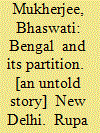

|
|
|
|
|
| Publication |
New Delhi, Rupa Publications India Pvt Ltd, 2021.
|
| Description |
x, 213p.hbk
|
| Standard Number |
9789353339586
|
|
|
|
|
|
|
|
|
|
|
|
Copies: C:1/I:0,R:0,Q:0
Circulation
| Accession# | Call# | Current Location | Status | Policy | Location |
| 060005 | 891.44/MUK 060005 | Main | On Shelf | General | |
|
|
|
|
| 15 |
ID:
034517


|
|
|
|
|
| Publication |
s.l., Sint Niklaas Waas, 1970.
|
| Description |
155p.
|
|
|
|
|
|
|
|
|
|
|
|
Copies: C:1/I:0,R:0,Q:0
Circulation
| Accession# | Call# | Current Location | Status | Policy | Location |
| 009342 | 016.364151/VAN 009342 | Main | On Shelf | General | |
|
|
|
|
| 16 |
ID:
040226
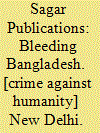

|
|
|
|
|
| Publication |
New Delhi, Sagar publications, 1971.
|
| Description |
134p.hbk
|
|
|
|
|
|
|
|
|
|
|
|
Copies: C:1/I:0,R:0,Q:0
Circulation
| Accession# | Call# | Current Location | Status | Policy | Location |
| 007823 | 954.9205/SAG 007823 | Main | On Shelf | General | |
|
|
|
|
| 17 |
ID:
156897
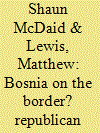

|
|
|
|
|
| Summary/Abstract |
Unionist politicians have argued that Republican political violence on the Irish border, during both the partition of Ireland and more recent Northern Ireland conflict, constituted ethnic cleansing and genocide against the Protestant/Unionist community in those areas. These views have been bolstered by an increasingly ambivalent scholarly literature that has failed to adequately question the accuracy of these claims. This article interrogates the ethnic cleansing/genocide narrative by analysing Republican violence during the 1920s and the 1970s. Drawing from a wide range of theoretical literature and archival sources, it demonstrates that Republican violence fell far short of either ethnic cleansing or genocide, (in part) as a result of the perpetrators’ self-imposed ideological constraints. It also defines a new interpretive concept for the study of violence: functional sectarianism. This concept is designed to move scholarly discussion of political and sectarian violence beyond the highly politicised and moral cul-de-sacs that have heretofore characterised the debate, and has implications for our understanding of political violence beyond Ireland.
|
|
|
|
|
|
|
|
|
|
|
|
|
|
|
|
| 18 |
ID:
107006
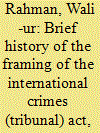

|
|
|
|
|
| Publication |
Dhaka, Bangladesh Heritage foundation, 2009.
|
| Description |
47p.
|
| Standard Number |
9789843303462
|
|
|
|
|
|
|
|
|
|
|
|
Copies: C:1/I:0,R:0,Q:0
Circulation
| Accession# | Call# | Current Location | Status | Policy | Location |
| 056159 | 341.77/RAH 056159 | Main | On Shelf | General | |
|
|
|
|
| 19 |
ID:
108508
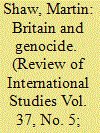

|
|
|
|
|
| Publication |
2011.
|
| Summary/Abstract |
This article (originally given as the Annual War Studies Lecture at King's College, London, on 25 January 2010) challenges the assumption that Britain's relationship to genocide is constituted by its 'vigilance' towards the genocide of others. Through a critical overview of the question of genocide in the historical and contemporary politics of the British state and society, the article suggests their wide-ranging, complex relationships to genocide. Utilising a conception of genocide as multi-method social destruction and applying the interpretative frames of the genocide literature, it argues that the British state and elements of identifiably British populations have been involved directly and indirectly in genocide in a number of different international contexts. These are addressed through five themes: the role of genocide in the origins of the British state; the problem of genocide in the Empire and British settler colonialism; Britain's relationships to twentieth-century European genocide; its role in the genocidal violence of decolonisation; and finally, Britain's role in the genocidal crises of the post-Cold War world. The article examines the questions of national responsibility that this survey raises: while rejecting simple ideas of national responsibility as collective guilt, it nevertheless argues that varying kinds of responsibility for genocide attach to British institutions, leaders and population groups at different points in the history surveyed.
|
|
|
|
|
|
|
|
|
|
|
|
|
|
|
|
| 20 |
ID:
187393
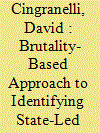

|
|
|
|
|
| Summary/Abstract |
The comparative study of atrocities and atrocity prevention faces several obstacles including a lack of consensus on the universe of cases and too few cases to statistically test alternative theories. The brutality-based (BB) conception is based on the idea that widespread, state-led violations of physical integrity rights constitute an assault on the personhood and human dignity of the members of society— a mass atrocity. Applying this idea to all countries annually systematically identifies a larger number of atrocities and facilitates categorization into three levels of intensity. The BB methodology for generating annual atrocity lists is replicable and transparent. The findings show that, between 1981 and 2019, the frequency of atrocities as defined and identified by other projects has been decreasing, but BB atrocities have been increasing. The sequence of different types of widespread physical integrity violations suggests new avenues for research on atrocity occurrence, escalation, de-escalation, and cessation.
|
|
|
|
|
|
|
|
|
|
|
|
|
|
|
|
|
|
|
|
|